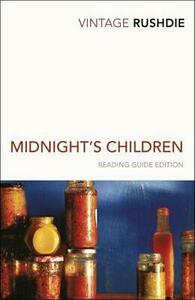You need to sign in or sign up before continuing.
Take a photo of a barcode or cover
A bit slow for my liking, don't see what all the fuss is about, didn't actually make it to the end, anyone want to tell me what happens that is so amazing?
adventurous
emotional
funny
informative
mysterious
reflective
medium-paced
Plot or Character Driven:
A mix
Strong character development:
Yes
Loveable characters:
Yes
Diverse cast of characters:
Yes
Flaws of characters a main focus:
Yes
the story of india from independence on, through the life of one man. fascinating in that way, although rushdie's tendencies do take some getting used to.
8/10
Rushdie's style brims with comical exaggeration at just the right pitch to blend effortlessly with the book's magical realism. Funny, touching, and distinctively effervescent, Rushdie’s writing carries the reader away in a torrent images and language. We follow the story of Saleem, born on midnight of India’s independence, which imbues him (and the other children of the midnight) with magical power and tying them to the history of the country (or does it?). At times the reader can feel a bit buried, but keep digging and you’ll always come out the other side richer for it.
Rushdie's style brims with comical exaggeration at just the right pitch to blend effortlessly with the book's magical realism. Funny, touching, and distinctively effervescent, Rushdie’s writing carries the reader away in a torrent images and language. We follow the story of Saleem, born on midnight of India’s independence, which imbues him (and the other children of the midnight) with magical power and tying them to the history of the country (or does it?). At times the reader can feel a bit buried, but keep digging and you’ll always come out the other side richer for it.
There are certainly flashes of real brilliance in this novel - especially in the first half of the narrative, but taken as a whole I found it to be a very frustrating experience. The further you read, the less satisfying the work becomes and by the final third I was just desperate to get to the end so I could put it down once and for all. This is a sprawling, messy concoction. I get that the structure and narrative style are reflections of the state of the Indian sub-continent in the years after partition, but these literary conceits are simply not enough to justify their negative impact on the story-telling. To me it felt that Rushdie had woven a narrative around a series of over-worked and over-wrought political, social and spiritual metaphors, which is all back to front - the narrative should be served by the symbolism, not the other way around.
Undoubtedly interesting and arresting at times, but it's a case of diminishing returns as the reader progresses through the work. For me there are far better places to go if you want to explore these ideas - Rohinton Mistry's staggeringly good 'A Fine Balance' blows 'Midnight's Children' out of the water. Alternatively, if you want a magic realist narrative about a nation in a state of chaotic redefinition, then go to 'The Tin Drum' - once you've read Grass' novel there's little in Rushdie's that will feel new or original to you.
Undoubtedly interesting and arresting at times, but it's a case of diminishing returns as the reader progresses through the work. For me there are far better places to go if you want to explore these ideas - Rohinton Mistry's staggeringly good 'A Fine Balance' blows 'Midnight's Children' out of the water. Alternatively, if you want a magic realist narrative about a nation in a state of chaotic redefinition, then go to 'The Tin Drum' - once you've read Grass' novel there's little in Rushdie's that will feel new or original to you.
Beginning a book by Rushdie requires an adjustment period. His paragraphs are streams of description that are so loud, intricate, and vibrant you forget the piece of the plot you were meant to notice. The focus of midnight's children is so compelling that once you've adjusted to the world of smells and holes you don't really care to leave.
A monumental novel that’s a family saga linked to the history of independent India but also (forgive me the cliché Saleem) so much more.
There’s allegory, allusion, recurrences, and logic. The logic – the magic/supernatural connections between characters born at the time of independence and the life of the country that started that day – is just so enjoyable and makes the mysterious coherent. Myth is a major theme. The subjectivity of the fictional author and metatextuality is hugely important. And I think I’ve barely scratched the surface of interesting things to say about Midnight’s Children.
I worried the sheer weight of the accumulated narrative would be too much by the end but the finale is wonderful and resolves as neatly as all the preceding episodes do.
This was published the year I was born which I find pretty funny…
There’s allegory, allusion, recurrences, and logic. The logic – the magic/supernatural connections between characters born at the time of independence and the life of the country that started that day – is just so enjoyable and makes the mysterious coherent. Myth is a major theme. The subjectivity of the fictional author and metatextuality is hugely important. And I think I’ve barely scratched the surface of interesting things to say about Midnight’s Children.
I worried the sheer weight of the accumulated narrative would be too much by the end but the finale is wonderful and resolves as neatly as all the preceding episodes do.
This was published the year I was born which I find pretty funny…
Often brilliant. Only the slow war chapters at the start of book three kept me from giving it 5 stars.




